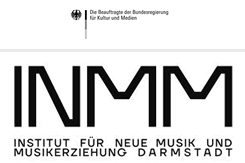02.09.–13.09.2021
ARTISTS IN RESIDENCE:
ADRIANA HÖLSZKY
COMPOSER IN RESIDENCE
When one thinks of the Romanian-German composer Adriana Hölszky (*1953), three things spontaneously come to mind: her penchant for bizarre stories, behind which the dark side of history lurks; her creative way of handling the human voice; and the three-dimensionality of many of her pieces. Concealed behind all these characteristics is an eminent theatrical interest.
Already in her first musical theatre piece Hölszky drew on a gruesome theme. But in her version of Bremer Freiheit (Bremen Freedom), 1987, the fate of the poisoner Geesche Gottfried is narrated in a grotesque Grand Guignol style, which is even expanded in the second stage piece by the composer: Die Wände, 1993-95, based on the drama Les paravents (The Screens) by Jean Genet. In it, she produces an effect of whispering mysteriousness through the distribution of several instrumentalists throughout the space and through the choir, which musically symbolizes the screens.
Even in Hölszky’s non-stage works this sense of the spatial and three-dimensional comes out in many of her vocal works, for example in Gemälde eines Erschlagenen (Painting of a Man Beaten to Death), a homage to the poet Jakob Michael Reinhold Lenz, in which the 72 singers arranged throughout the auditorium create a spiral of phonetic sounds. Twenty years later in her most recent musical theatre piece Böse Geister (Evil Spirits), 2013, based on Dostoevsky’s Demons, the choir even assumes the enigmatic leading role.
Many of Hölszky’s chamber music works also possess an intrinsic theatrical aspect, perhaps most pronounced in her Tragödia – Der unsichtbare Raum (Tragedy: The Invisible Room), 1996/97, in which the composer transcends the genre boundaries: because the work is an ,instrumental musical theatre‘ without actors or singers, which nevertheless conjures up theatrical images in the audience’s heads. Hölszky will be a great asset to IEMA in 2021, not only because of her diverse pieces but also thanks to her many years of experience in teaching, for example at the Mozarteum in Salzburg from 2000 to 2013.
FRANK GRATKOWSKI
IMPROVISER IN RESIDENCE
Whether in subtle improvisations or loud rock-jazz, whether in electronic or microtonal experiments, the German clarinettist and saxophonist Frank Gratkowski is at home in different musical contexts. Even though he trained as a jazz musician at the Cologne Academy of Music and continued his studies with Charlie Mariano and Steve Lacy, among others, the Berlin-based musician has also been interested in composed contemporary music. As sources of inspiration he names Gérard Grisey and Tristan Murail, two proponents of French spectralism, as well as György Ligeti, Luciano Berio, Pierre Boulez, and Helmut Lachenmann.
While Gratkowski concentrated exclusively on free improvisation at the beginning of his career – for example as a member of Georg Graewe’s Grubenklang Orchester or the ensemble Zeitkratzer or as part of a trio with Achim Kaufmann and Wilbert de Joode – his interest in new music also eventually led to collaboration with artists from a completely different music scene. At Mills College in Oakland he met the pianist and electronic musician Chris Brown and the percussionist William Winant, both well-known as interpreters of new music. Together with the two of them, Gratkowski has been playing in an experimental live electronics improvisation trio since 2006.
Born in Hamburg in 1963, Gratkowski was eventually led by his increasing interest in microtonality to start composing himself. His works are fascinating sound pieces inspired by Giacinto Scelsi or Georg Friedrich Haas and have meanwhile been recorded on CD by his saxophone quartet F[o]ur Alto. But there is also a completely different, wild rock-jazz side to Gratkowski, which he lives out in the quintet Z-Country Paradise with the raw front woman Jelena Kuljic.
Because of this enormous diversity and his years of teaching experience in Cologne, Frank Gratkowski is predestined to teach IEMA’s improvisation course.

